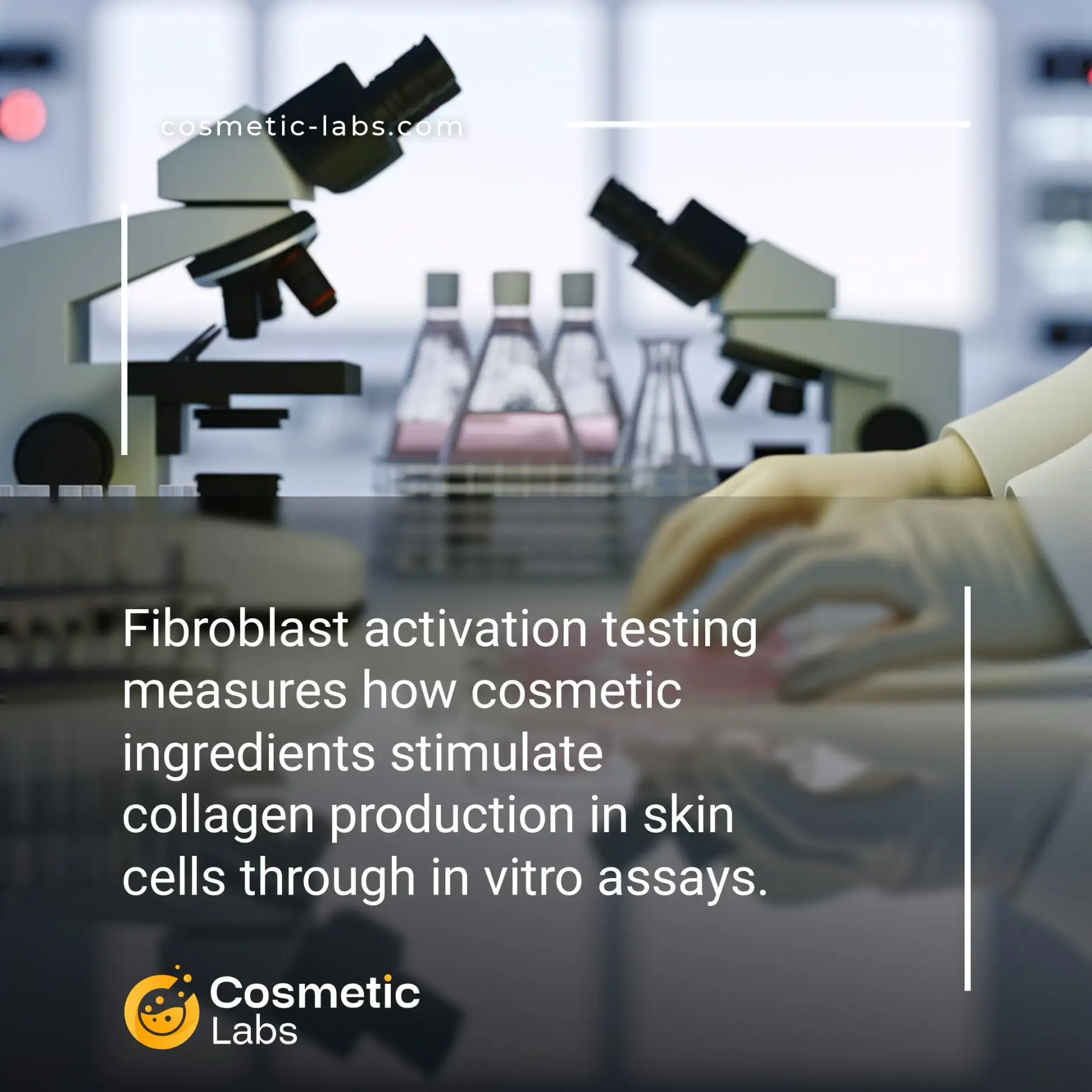Fibroblast Activation Testing Services for Anti-Aging Products

What is Fibroblast activation testing?
Fibroblast activation testing is a lab-based assay that measures how effectively anti-aging ingredients stimulate collagen-producing cells in skin tissue. Labs use human fibroblast cultures to evaluate ingredient potency, testing collagen synthesis rates and cellular proliferation over 24-72 hour periods. This method provides quantifiable data on skin rejuvenation potential before costly clinical trials, helping brands validate their formulations and support marketing claims with scientific evidence.
Why do you need this service?
Cosmetic labs use fibroblast activation assays to validate peptide serums and retinol formulations before market launch, measuring collagen synthesis rates and cellular regeneration markers. Brand owners rely on these tests to support marketing claims about wrinkle reduction and skin firmness, while ingredient suppliers use the data to demonstrate raw material efficacy for licensing agreements.
Who provides Fibroblast activation testing services?
All cosmetic labs providing Fibroblast activation testing services
There is no company providing these services at the moment.
Fibroblast Activation Testing for Anti-Aging Products
Fibroblast activation testing measures how effectively your anti-aging ingredients stimulate collagen production and cellular renewal. This preclinical testing validates your product’s ability to boost skin regeneration before market launch.
Cell Culture Analysis Methods
Labs use primary human dermal fibroblasts to test ingredient efficacy in controlled environments. These cells respond to active compounds by increasing collagen synthesis and proliferation rates. Testing protocols measure cellular metabolic activity through MTT assays and track gene expression changes over 24-72 hour periods.
Key measurements include:
- Collagen type I and III production levels
- Elastin fiber formation rates
- Hyaluronic acid synthesis markers
- Cell viability and proliferation indices
Biomarker Validation Protocols
Advanced testing examines specific anti-aging biomarkers that correlate with visible skin improvements. Labs analyze procollagen peptide levels, matrix metalloproteinase activity, and antioxidant enzyme expression. These markers predict real-world performance and support marketing claims.
Testing typically requires 2-4 weeks for complete analysis. Results include dose-response curves and statistical significance data that regulatory bodies accept. Partner labs on our platform provide detailed reports with comparative benchmarking against established anti-aging compounds.
Ready to validate your anti-aging formulation’s cellular efficacy? Connect with specialized testing laboratories through our platform to discuss your specific requirements and timeline.
Practical Applications of Fibroblast Activation Testing for Anti-Aging Services
Cosmetic labs use fibroblast activation testing for anti-aging services to validate ingredient efficacy and support product claims with measurable cellular responses.
Ingredient Efficacy Validation
Labs expose cultured fibroblasts to test compounds and measure collagen synthesis rates, elastin production, and cell proliferation markers. This testing identifies which concentrations produce optimal cellular responses within 24-72 hour timeframes. Teams track procollagen I C-peptide levels and hydroxyproline content to quantify collagen production increases.
The data supports specific product claims like “increases collagen production by 35%” or “stimulates cellular renewal.” Brand owners receive detailed reports showing dose-response curves and statistical significance for regulatory submissions.
Formulation Development Support
Product developers use fibroblast assays to compare different active ingredients and optimize formulation ratios. Labs test individual compounds against combination formulas to identify synergistic effects on cellular metabolism and matrix protein synthesis.
This approach helps brands select the most effective ingredient combinations before moving to clinical trials. Testing reveals which formulations trigger maximum fibroblast activation while maintaining cell viability above 85% thresholds.
| Test Parameter | Measurement Method | Typical Timeline | Key Outcome |
|---|---|---|---|
| Collagen Synthesis | ELISA assay for procollagen | 48-72 hours | Quantified production increase |
| Cell Proliferation | MTT viability assay | 24-48 hours | Growth rate percentage |
| Elastin Production | Immunofluorescence staining | 72-96 hours | Protein expression levels |
| Gene Expression | qPCR analysis | 6-24 hours | Transcriptional activity |
Ready to validate your anti-aging ingredients with professional fibroblast activation testing? Connect with experienced cosmetic labs on our platform to discuss your specific testing requirements and timeline.
